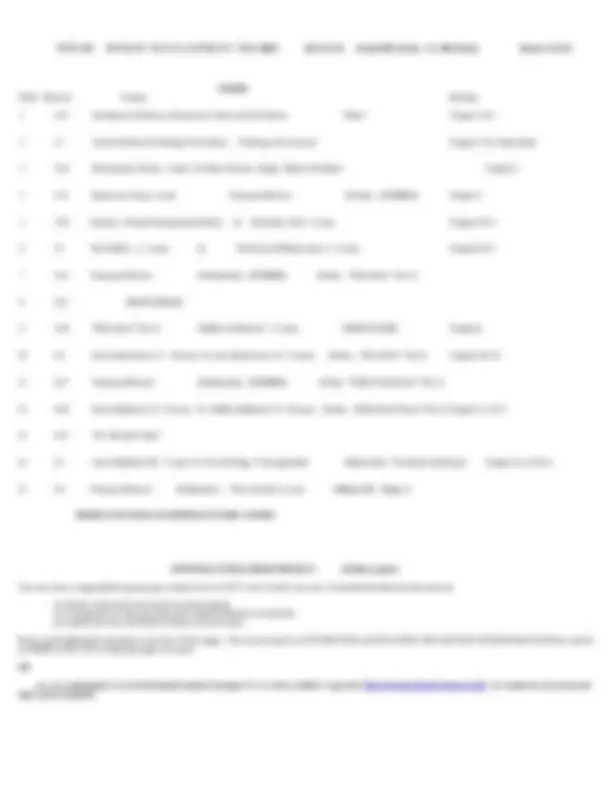



Study with the several resources on Docsity

Earn points by helping other students or get them with a premium plan


Prepare for your exams
Study with the several resources on Docsity

Earn points to download
Earn points by helping other students or get them with a premium plan
Community
Ask the community for help and clear up your study doubts
Discover the best universities in your country according to Docsity users
Free resources
Download our free guides on studying techniques, anxiety management strategies, and thesis advice from Docsity tutors
The syllabus for a human development course (psyc 203) offered at towson university. The course covers human development from conception through advanced age and death, with a focus on psycho-social approach. The syllabus includes required and recommended readings, grading policy, attendance policy, and a detailed schedule. The course goals are to gain an understanding of human development process and theory through significant theoreticians like freud, piaget, and erickson, and to apply this understanding positively in human service practice.
Typology: Lecture notes
1 / 2

This page cannot be seen from the preview
Don't miss anything!


PSYC 203 H U M A N D E V E L O P M E N T SYLLABUS (M, W & F) Section 003 (11am) & 004 (Noon) Room LA 3114 Schedule Week Date (m) Content Reading 1 1/31 Introduction & History, Psychosocial Theory & Erik Erikson “Koko” Chapter 1 & 2 2 2/7 Natural Selection & Biological Evolution, "Walking with Cavemen" Chapter 3 & Study Guide 3 2/14 Psychosexual Theory - Freud & Other Theories, Piaget, Maslow & Allport Chapter 3 4 2/21 Behavioral Theory (cont) Wrap up & Review ( Friday ) ( EXAM 1) Chapter 3 5 2/28 Genetics, Prenatal Development & Birth & The Infant, Birth - 2 years Chapter 4 & 5 6 3/7 The Toddler, 2 - 4 years & The Early Childhood years, 4 - 6 years Chapter 6 & 7 7 3/14 Wrap up & Review ( Wednesday ) ( EXAM 2) (Friday “Billy Elliot” Part 1) 8 3/21 SPRING BREAK 9 3/28 “Billy Elliot” Part 2) Middle Childhood, 6 - 12 years (ADHD & ODD) Chapter 8 10 4/4 Early Adolescence, 12 - 18 years & Late Adolescence, 18 - 24 years (Friday “Billy Elliot” Part 3) Chapter 9 & 10 11 4/11 Wrap up & Review ( Wednesday ) ( EXAM 3) (Friday “Rabbit Proof Fence” Part 1) 12 4/18 Early Adulthood, 24 - 34 years & Middle Adulthood 34 - 60 years (Friday “Rabbit Proof Fence” Part 2) Chapter 11 & 12 13 4/25 "Mr. Holland's Opus” 14 5/2 Later Adulthood 60 - 75 years & Very Old Age, 75 through death (Kubler-Ross "On Death and Dying") Chapter 13, 14 & 15 15 5/9 Wrap up & Review (Wednesday) .. “Home Study” no class Friday 5/13 Exam 4 THERE IS NO FINAL EXAM PER SE IN THIS COURSE OPTIONAL EXTRA CREDIT PROJECT (8 Merit points) You may write a 2 page (double spaced, type written) review of ANY movie or book you wish. It should be divided into three sections: (1) Review of the story line (ie. tell me what its about). (2) Critique (tell me what you liked and/or disliked about the movie/book). (3) Explain how the movie/book connects with our course. Points will be deducted if your paper is less than 2 FULL pages. This may be turned in ANYTIME UPTO and INCLUDING THE LAST DAY OF REGULAR CLASS but must be on PAPER (I WILL NOT accept your paper via email). OR you may participate in a school based research project (1 or more credits). Log onto http://researchpool.towson.edu to create an account and sign up for projects.